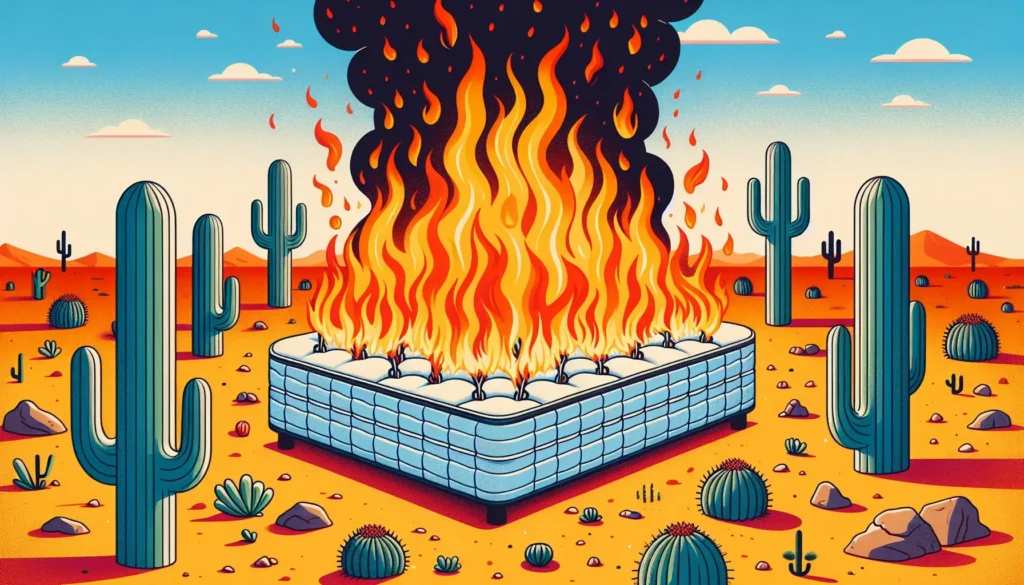Daftar Isi
BeralihPendahuluan
Kasur bisa jadi sulit untuk dibuang saat masa pakainya sudah habis. Beberapa orang menganggap membakar kasur lama mereka sebagai solusi cepat, tetapi apakah ini aman, legal, atau bertanggung jawab terhadap lingkungan? Artikel ini mengupas kompleksitas membakar kasur, mengeksplorasi pertimbangan hukum, dampak lingkungan, dan metode pembuangan alternatif untuk membantu Anda membuat keputusan yang tepat.

Bolehkah Membakar Kasur di Halaman Belakang Rumah?
Peraturan Hukum
Membakar kasur di halaman belakang rumah Anda mungkin terlihat nyaman, tetapi di sebagian besar tempat, hal itu ilegal. Banyak negara bagian dan kota memiliki peraturan ketat yang melarang pembakaran barang-barang rumah tangga berukuran besar secara terbuka karena masalah kesehatan dan lingkungan. Pelanggaran terhadap peraturan ini dapat menyebabkan denda dan konsekuensi hukum. Selalu periksa hukum setempat untuk memastikan Anda membuang barang dengan benar.
Masalah Keamanan
Bahkan jika itu legal, membakar sebuah kasur bisa sangat berbahaya. Kasur mengandung berbagai bahan, termasuk busa, serat sintetis, dan terkadang pegas logam, yang semuanya dapat menimbulkan bahaya kebakaran. Kebakaran yang tidak terkendali dapat menyebar dengan cepat, terutama di halaman belakang, sehingga membahayakan bangunan di sekitarnya dan lingkungan. Pemadam kebakaran menyarankan agar tidak membakar barang-barang besar dan rumit seperti kasur karena dapat dengan mudah menyebabkan kecelakaan yang tidak diinginkan.
Metode Pembuangan yang Tepat
Daripada menggunakan cara pembakaran, sangat penting untuk mempertimbangkan metode pembuangan yang lebih aman. Banyak kota menawarkan program daur ulang kasur atau hari pengumpulan khusus untuk barang-barang berukuran besar. Hubungi layanan pengelolaan sampah setempat untuk mendapatkan panduan tentang cara yang paling bertanggung jawab untuk membuang kasur lama Anda.
Alternatif lain dari Membakar Kasur
Opsi Daur Ulang
Daur ulang kasur adalah salah satu cara yang paling ramah lingkungan untuk membuang kasur. Fasilitas daur ulang dapat memecah kasur menjadi komponen-komponen dasarnya, seperti pegas logam, rangka kayu, dan busa. Bahan-bahan ini kemudian digunakan kembali, mengurangi limbah TPA dan melestarikan sumber daya. Beberapa negara bagian, seperti California, bahkan mewajibkan program daur ulang kasur, sehingga mudah untuk menemukan fasilitas terdekat.
Peluang Donasi
Jika kasur Anda masih dalam kondisi layak pakai, pertimbangkan untuk menyumbangkannya. Banyak organisasi amal yang menerima kasur bekas yang masih layak pakai untuk membantu orang-orang yang membutuhkan. Sebelum menyumbangkan, pastikan kasur Anda memenuhi standar organisasi untuk kebersihan dan kondisinya. Donasi dapat memperpanjang usia kasur Anda sekaligus membantu orang lain.
Ide Upcycling
Upcycling adalah cara kreatif untuk menggunakan kembali kasur lama Anda. Misalnya, Anda dapat menggunakan busa sebagai bantalan untuk proyek-proyek DIY, mengubah bingkai menjadi teralis taman, atau menggunakan kembali pegas untuk seni atau dekorasi rumah. Dengan mendaur ulang, Anda memberikan kehidupan baru pada komponen kasur, menjauhkannya dari tempat pembuangan sampah dan menambahkan sentuhan pribadi pada ruangan Anda.
Mengapa Membakar Kasur Berbahaya
Pelepasan Bahan Kimia Beracun
Kasur sering kali dilapisi dengan penghambat api dan mengandung bahan sintetis yang ketika dibakar akan melepaskan bahan kimia beracun. Bahan-bahan tersebut termasuk senyawa organik yang mudah menguap (VOC), formaldehida, dan polibrominasi difenil eter (PBDE), yang dapat membahayakan kesehatan manusia dan menyebabkan masalah pernapasan dan kondisi kesehatan lainnya.
Polusi Udara
Membakar kasur akan mengeluarkan asap yang mengandung partikel-partikel berbahaya yang dapat mencemari udara. Partikel-partikel ini dapat berpindah tempat dan berdampak pada kesehatan orang-orang di sekitarnya. Kualitas udara yang buruk mempengaruhi semua orang, terutama mereka yang memiliki asma, alergi, dan masalah pernapasan lainnya. Untuk alasan ini, membakar kasur harus dihindari.
Dampak terhadap Lingkungan
Selain dampak kesehatan, dampak lingkungan dari membakar kasur juga signifikan. Bahan kimia beracun yang dilepaskan ke udara dapat berkontribusi pada penumpukan gas rumah kaca, yang memperburuk perubahan iklim. Selain itu, bahan kimia ini dapat mengendap di tanah dan air, yang selanjutnya mencemari ekosistem dan membahayakan satwa liar.
Kesalahpahaman Umum Tentang Membakar Kasur
Mitos vs Realita
Kesalahpahaman yang umum terjadi adalah bahwa membakar kasur adalah cara yang cepat dan tidak berbahaya untuk membuangnya. Namun, seperti yang telah kita bahas, praktik ini jauh dari tidak berbahaya. Kasur tidak dirancang untuk dibakar, dan bahan yang dikandungnya sangat beracun ketika dinyalakan. Meskipun terlihat mudah, namun dampaknya bagi kesehatan pribadi dan lingkungan sangat luas.
Konsekuensi Hukum
Beberapa orang percaya bahwa membakar kasur di halaman belakang rumah tidak akan diketahui. Namun, jika pihak berwenang setempat mengetahui hal ini, dampak hukumnya bisa sangat berat. Denda untuk pembakaran ilegal bisa sangat mahal, dan di beberapa daerah, pelanggar yang berulang kali melakukan pelanggaran dapat menghadapi hukuman yang lebih berat. Sangat penting untuk memahami risiko hukum yang terkait dengan pembakaran barang-barang rumah tangga seperti kasur.
Kesimpulan
Membakar kasur mungkin terlihat seperti cara yang mudah untuk membuang barang lama dan besar, tetapi cara ini memiliki kekurangan dari segi hukum, kesehatan, dan lingkungan. Mulai dari pelepasan bahan kimia beracun hingga polusi udara dan dampak hukum, membakar kasur bukanlah metode pembuangan yang bertanggung jawab. Sebagai gantinya, pertimbangkan alternatif lain seperti mendaur ulang, mendonasikan, atau mendaur ulang untuk memastikan pendekatan yang lebih aman dan berkelanjutan. Dengan memilih metode pembuangan yang bertanggung jawab, Anda berkontribusi pada lingkungan yang lebih sehat dan memberikan contoh yang dapat diikuti oleh orang lain.
Pertanyaan Umum
1. Apakah legal membakar kasur di halaman belakang rumah saya?
Secara umum, tidak. Sebagian besar peraturan lokal dan negara bagian melarang pembakaran terbuka barang-barang rumah tangga besar seperti kasur karena alasan keamanan dan lingkungan.
2. Apa saja dampak lingkungan dari membakar kasur?
Membakar kasur akan melepaskan bahan kimia beracun ke udara, berkontribusi terhadap polusi udara, membahayakan kesehatan manusia, dan mempengaruhi iklim.
3. Bagaimana cara membuang kasur dengan benar tanpa membakarnya?
Pertimbangkan untuk mendaur ulang, mendonasikan, atau mendaur ulang kasur Anda. Hubungi layanan pengelolaan limbah setempat untuk mendapatkan panduan tentang opsi pembuangan yang tepat di daerah Anda.
Artikel ini bertujuan untuk mengedukasi dan mendorong para pembaca untuk menghindari pembakaran kasur dan mencari alternatif pembuangan yang berkelanjutan. Dengan memahami risikonya dan membuat pilihan yang bertanggung jawab, Anda membantu melindungi komunitas dan lingkungan Anda.
